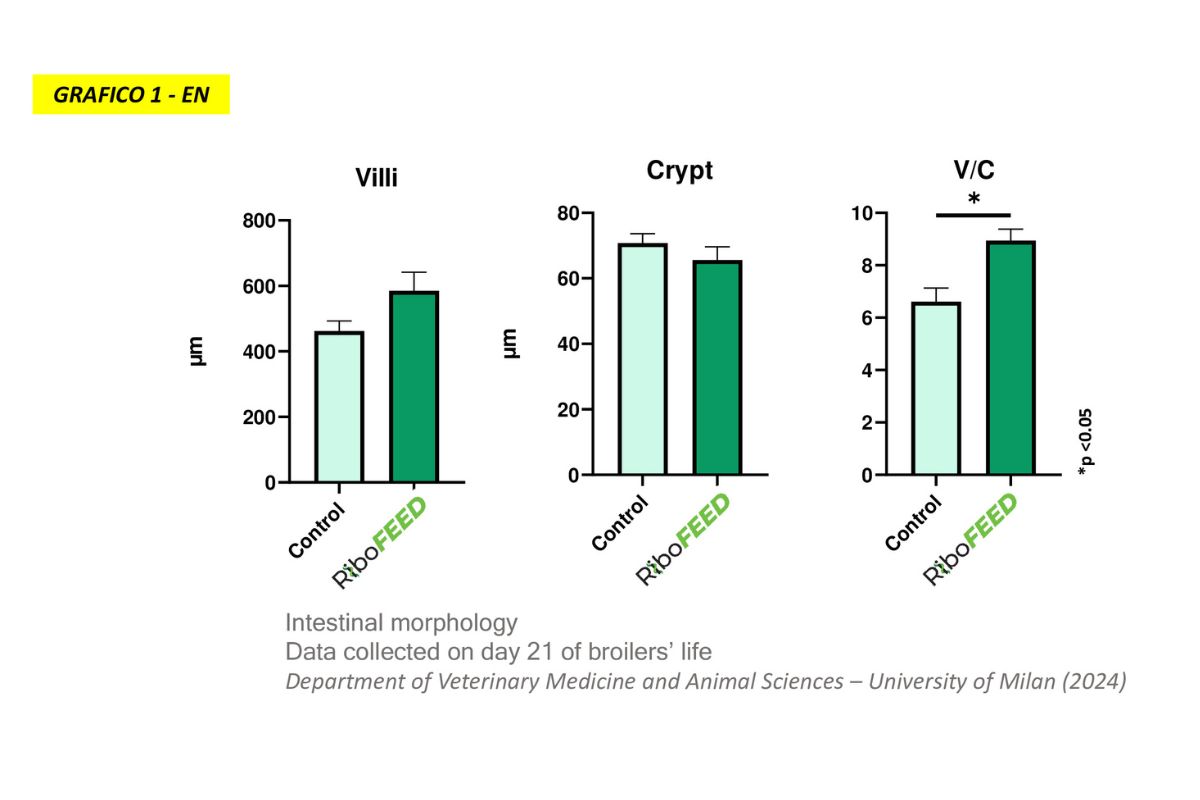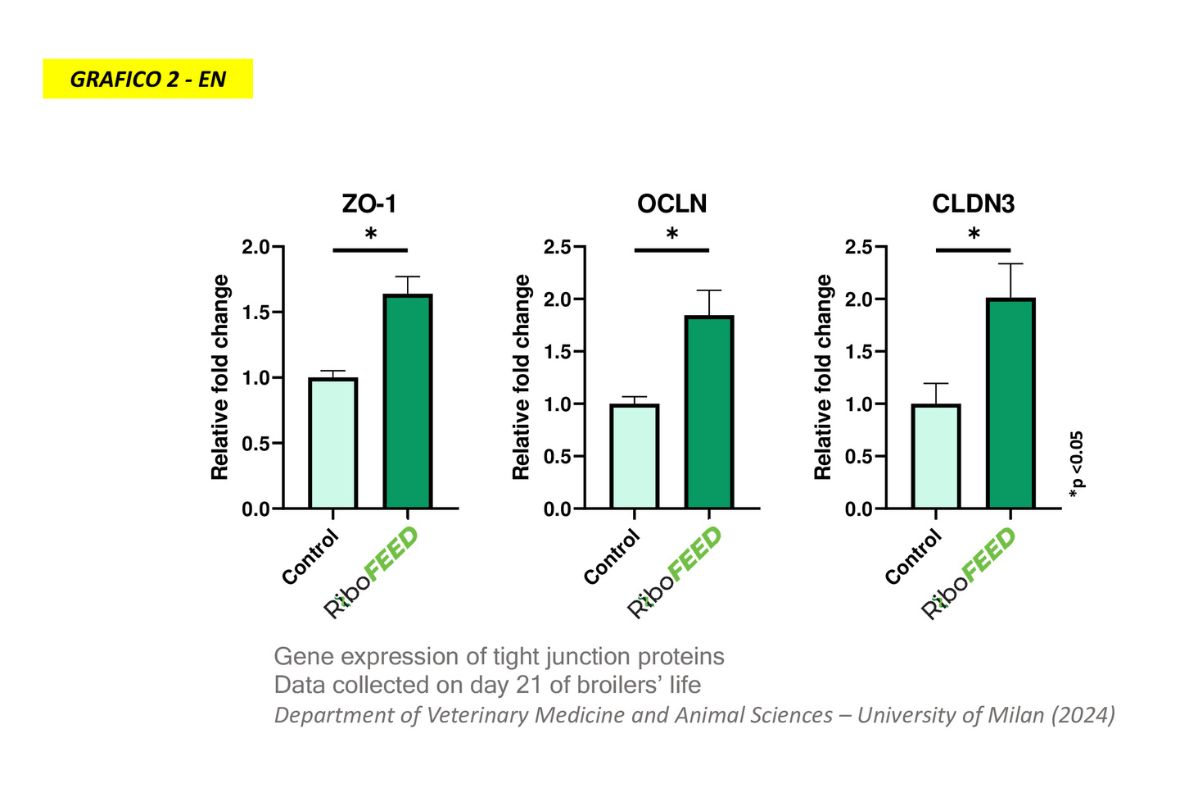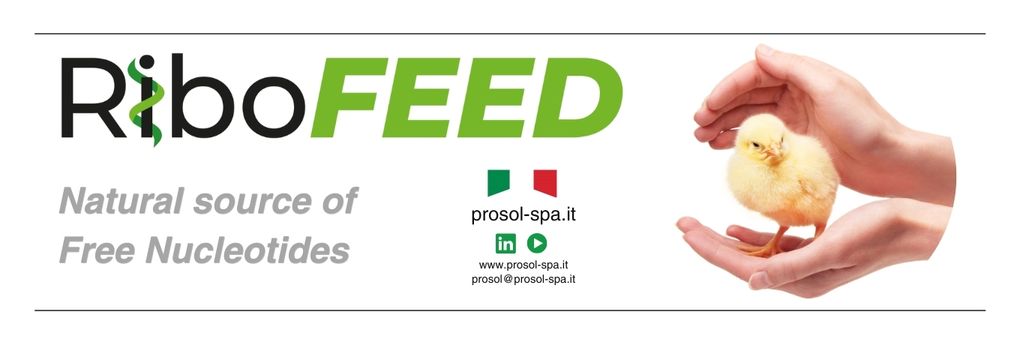
By supporting a balanced microflora and promoting the functional integrity of the intestine, nucleotides contribute to improved digestive efficiency and enhanced natural defense against pathogens.
For any living organism, the early stages of life represent a critical phase for development and future adaptability to the environment. In chicks, this delicate period is marked by a series of physiological processes that must occur efficiently and in a coordinated manner to ensure rapid and robust growth. Among these processes, one of the most complex and influential is the development of the digestive system.
In chicks, the digestive system develops rapidly from the very first days of life, outpacing the growth of any other tissue. This development is not merely a matter of dimensional growth but also involves the acquisition of full digestive functionality.
Simultaneously, a multitude of microorganisms colonizes the intestinal environment, forming a dense community of bacteria, fungi, protozoa, and viruses that collectively constitute the so-called gut microbiota.
The delicate balance established between the young animal and the microorganisms inhabiting its gut is crucial for the chick’s health, as it affects not only growth but also the ability to respond to environmental stressors and diseases.
Given the importance of ensuring the chick’s gut becomes efficient as quickly as possible, since optimal digestion and nutrient absorption are essential for healthy growth and high feed conversion, early intervention to protect this balance is imperative. From the first week of life, strategies should focus on promoting rapid colonization and proper maturation of the gut microbiota by investing in nutritional solutions that foster the development of a healthy and resilient intestine. Addressing an already mature or compromised microbiota later is much more challenging.
Every nutritional decision made during the initial stages can have profound and lasting impacts, helping to achieve the goal more quickly: supporting a microbiota that is mature, rich, stable, and more resistant to stress.
Such considerations emphasize that providing appropriate support for intestinal development must be a top priority for those involved in poultry farming, as this is critical for both animal welfare and the economic well-being of the farmer.
In this context, yeast-derived nucleotides can play a key role.
Nucleotides are the fundamental building blocks of nucleic acids and are involved in the synthesis of DNA and RNA. They are thus essential molecules during periods of rapid cell division and tissue renewal, particularly in the intestinal lining. Providing nucleotides through the diet from the earliest days of life can accelerate the development of the intestinal tract, supporting the formation of intestinal villi (Graph 1) and the maturation of epithelial cells.
 Additionally, nucleotides can positively influence the composition of the gut microflora. They serve as specific energy substrates for beneficial bacteria such as lactobacilli and bifidobacteria, promoting their proliferation over pathogenic bacteria. Moreover, they contribute to the production of short-chain fatty acids (SCFAs) by the microbiota, which are beneficial for intestinal health.
Additionally, nucleotides can positively influence the composition of the gut microflora. They serve as specific energy substrates for beneficial bacteria such as lactobacilli and bifidobacteria, promoting their proliferation over pathogenic bacteria. Moreover, they contribute to the production of short-chain fatty acids (SCFAs) by the microbiota, which are beneficial for intestinal health.
The challenges of the intestinal tract: bacteria, toxins, and inflammation
The intestinal tract of chickens is continuously exposed to bacteria, toxins, and other potentially harmful elements. These factors can lead to clinical or subclinical inflammation and tissue damage, which, in turn, can result in economic losses for farmers.
In such a challenging environment, adopting measures to actively counter these threats is essential. Healthy and intact enterocytes form a critical barrier that prevents pathogens and toxins from entering the bloodstream and triggering systemic immune responses. Furthermore, efficient intestinal cells ensure better nutrient absorption, avoiding malabsorption that could lead to undesirable fermentations. These fermentations often promote the proliferation of pathogens such as Clostridium perfringens, E. coli, and Salmonella spp. in the distal part of the intestine.
At the intestinal level, particular attention must be given to tight junctions. These structures play a fundamental role in ensuring an adequate level of occlusion against potentially harmful substances. The degree of occlusion, and thus impermeability, depends on the number of interconnected strands forming the junction. If the number of strands is limited, the junctions appear loose or permeable (so-called “leaky junctions”). Conversely, a greater number of strands creates tighter junctions, better sealing the intercellular spaces between enterocytes and preserving intestinal integrity.
A recent study on broiler chickens demonstrated that using nucleotides increased the genetic expression of tight junction proteins such as Zo-1, Occludin, and Claudin 3 (Graph 2). This resulted in a strengthened intestinal barrier and enhanced resistance to bacterial infections and the translocation of potentially harmful toxins.
 Additionally, the study reported increased mucin production. Mucin reduces the risk of direct contact between pathogens and the epithelium and serves as an important substrate for beneficial bacteria such as lactobacilli and bifidobacteria, further supporting microbiota balance.
Additionally, the study reported increased mucin production. Mucin reduces the risk of direct contact between pathogens and the epithelium and serves as an important substrate for beneficial bacteria such as lactobacilli and bifidobacteria, further supporting microbiota balance.
Gut microbiota: the gut-brain axis
On an immunological level, a critical relationship exists between the gut microbiota and the central nervous system (CNS). This relationship is significantly strained when the host is exposed to specific stressors. Such stressors not only trigger inflammatory processes of varying intensity but also negatively affect gut health, compromising its permeability and making it more susceptible to infections and harmful dysbiosis.
By promoting the growth of beneficial bacteria such as lactobacilli and bifidobacteria, nucleotides help maintain a balanced microbiota—an essential factor for proper communication between the gut and the central nervous system (CNS).
Nucleotides: when to use them
Strategic use of nucleotides is critical during various stages of chicken growth.
During the Embryonic Phase
By injecting nucleotides in ovo, it is possible to strengthen the immunity and vitality of chicks, with evident benefits at hatching. These include increased resistance to infections in the early stages of life and a reduction in early mortality rates.
In the First Weeks of Life
During this period, the gut undergoes rapid cellular replication, and the immune system is not yet fully developed. Nucleotides play a crucial role in supporting intestinal development and promoting a rapid and effective immune response against stress, infections, and pathogens by increasing the production of lymphocytes and macrophages. Additionally, thanks to their ability to modulate inflammatory responses, nucleotides further strengthen defenses and are particularly valuable during vaccinations and pharmacological treatments, improving their effectiveness.
During Dietary Transitions
When included in feed during sensitive dietary changes, nucleotides help maintain the balance of the gut microflora, reducing the risk of imbalances.
In Stressful Situations
Nucleotides’ role in countering oxidative stress makes them a valuable resource in major stress scenarios such as overcrowding, transport, and environmental or climatic challenges.
Choosing a reliable source of nucleotides is essential to optimize the return on nutritional investment. RIBOFEED not only provides a high content of free nucleotides but, thanks to its specific hydrolysis process, makes them readily bioavailable. These advantages allow young animals to immediately utilize these molecules without additional metabolic costs, supporting cellular functions and vital processes necessary to achieve genetic potential and guaranteed performance. This ensures proper growth, even during periods of heightened vulnerability.


















